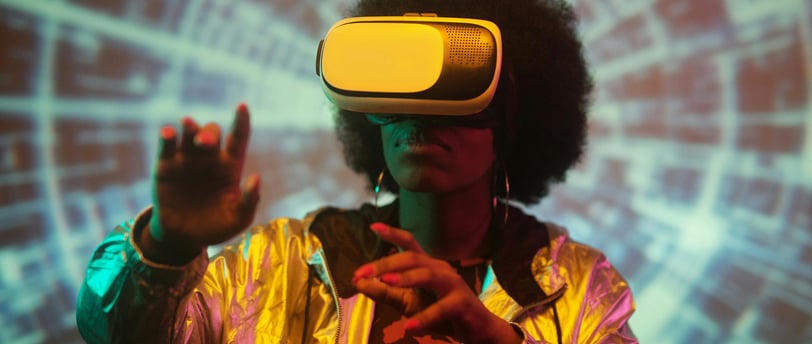Technology trends 2025: the future in 10 innovations
Discover the 10 technology trends that will transform the world by 2025 — from generative AI to neurotechnology and digital sustainability.
TECNOLOGIA
Gustavo Sobral
5/26/20253 min read


The speed at which technology advances is constantly redefining the way we live, work and interact with the world. From groundbreaking innovations in healthcare to the emergence of new digital paradigms, technological transformation is shaping the present and outlining the future with increasingly bold strokes.
As 2025 approaches, a number of trends are emerging as dominant forces that promise to reshape entire industries and create new opportunities for individuals, businesses, and governments. Knowing these trends is no longer an option—it’s a strategic necessity.
Check out the 10 technology trends below that you need to follow to be prepared for the future .
1. Generative artificial intelligence
Generative AI is no longer science fiction. Platforms such as ChatGPT and Midjourney have demonstrated the potential of AI to create texts, images, music and even videos with a high level of realism. By 2025, this technology is expected to become a massive productivity and creativity tool, being applied in education, marketing, engineering, healthcare and much more.
Companies that know how to integrate generative AI into their processes will gain speed, innovation and competitiveness.
2. Quantum computing
Although still in its infancy, quantum computing is evolving rapidly. Major players such as Google, IBM and specialized startups have been making significant progress towards building functional quantum computers that will be able to solve problems that are impossible for traditional computers.
In areas such as cryptography, molecular simulations, finance and logistics, the impacts will be profound and irreversible.
3. Blockchain and decentralized security
Blockchain continues its maturation and expansion path beyond cryptocurrencies. By 2025, we expect to see broader adoption of decentralized solutions for digital identity, smart contracts, supply chain traceability, and sensitive data protection.
With growing concerns about digital privacy and trust, blockchain will be a strategic tool for businesses and governments.
4. Advanced biotechnology
With the popularization of CRISPR and other gene-editing techniques, biotechnology is entering a new era. By 2025, we could see personalized cancer therapies, more resilient agricultural crops, and even genetic manipulation to prevent inherited diseases.
The intersection of biotechnology and AI promises to accelerate discoveries at an exponential pace.
5. Spatial computing and expanded reality
Spatial computing — a term used to describe the fusion of the physical and digital worlds — is set to gain prominence with more accessible augmented reality, virtual reality and mixed reality devices. The metaverse, once discredited, could be reborn with new, more realistic and practical applications.
Immersive experiences for education, corporate training and e-commerce will gain scale.
6. Multifunctional robotics
Robots will no longer have limited functions and will become more versatile, intuitive and autonomous. By 2025, we will see robots caring for the elderly, performing assisted surgeries, harvesting food in the fields and delivering goods in cities.
With the miniaturization of sensors and advances in machine learning, the potential of robotics will be explored in critical areas.
7. Post-quantum cybersecurity
With quantum computing posing a looming threat to current encryption methods, cybersecurity is set to undergo a major reinvention. Companies and governments are developing quantum-resistant encryption solutions — a trend that will be critical from 2025 onwards.
Data protection and system integrity will require new strategies, especially in the financial, military and healthcare sectors.
8. Digital sustainability
Green transformation also involves technology. The concept of digital sustainability involves the creation of technological solutions that minimize environmental impact: more efficient data centers, clean energy for connected devices, and environmental traceability via IoT and blockchain.
Companies aligned with ESG (Environmental, Social and Governance) will invest more in clean technology to serve conscious consumers.
9. 5G Connectivity and Beyond
With the expansion of 5G and the first steps towards 6G, connectivity will gain speed, stability and range. This will enable the advancement of smart cities, autonomous vehicles, remote surgeries, high-quality hybrid education and the Internet of Things (IoT) on a massive scale.
Connectivity will be the invisible infrastructure that underpins all other innovations.
10. Neurological expansion
Technologies that interact directly with the brain—such as neural interfaces and wearables that monitor brain activity—are evolving rapidly. By 2025, we could see advances in devices that enhance human cognition, help treat neurological diseases, and even allow us to control machines with our minds.
It is the era of neurotechnology and human-machine fusion.
The year 2025 promises to be a watershed year in global technological advancement. The trends described in this article are not just predictions: many of them are already underway and will profoundly impact our lives in the coming months.
Companies, professionals and governments that anticipate these changes will have a significant competitive advantage. Therefore, monitoring, understanding and preparing for these transformations is essential to thrive in the new technological scenario.
📌 Did you like the content?
Share this article with your network and help more people understand the future that has already begun!
